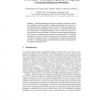Free Online Productivity Tools
i2Speak
i2Symbol
i2OCR
iTex2Img
iWeb2Print
iWeb2Shot
i2Type
iPdf2Split
iPdf2Merge
i2Bopomofo
i2Arabic
i2Style
i2Image
i2PDF
iLatex2Rtf
Sci2ools
119
click to vote
ECML
2005
Springer
2005
Springer
A SAT-Based Version Space Algorithm for Acquiring Constraint Satisfaction Problems
Constraint programming is rapidly becoming the technology of choice for modelling and solving complex combinatorial problems. However, users of this technology need significant expertise in order to model their problems appropriately. The lack of availability of such expertise is a significant bottleneck to the broader uptake of constraint technology in the real world. We present a new SAT-based version space algorithm for acquiring constraint satisfaction problems from examples of solutions and non-solutions of a target problem. An important advantage is the ease with which domain-specific knowledge can be exploited using the new algorithm. Finally, we empirically demonstrate the algorithm and the effect of exploiting domain-specific knowledge on improving the quality of the acquired constraint network.
Complex Combinatorial Problems | Constraint Programming | Constraint Satisfaction Problems | ECML 2005 |
| Added | 27 Jun 2010 |
| Updated | 27 Jun 2010 |
| Type | Conference |
| Year | 2005 |
| Where | ECML |
| Authors | Christian Bessière, Remi Coletta, Frédéric Koriche, Barry O'Sullivan |
Comments (0)

